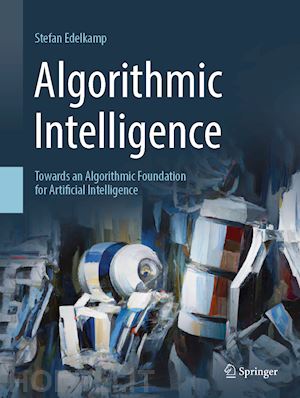

Questo prodotto usufruisce delle SPEDIZIONI GRATIS
selezionando l'opzione Corriere Veloce in fase di ordine.
Pagabile anche con Carta della cultura giovani e del merito, 18App Bonus Cultura e Carta del Docente
In this book the author argues that the basis of what we consider computer intelligence has algorithmic roots, and he presents this with a holistic view, showing examples and explaining approaches that encompass theoretical computer science and machine learning via engineered algorithmic solutions.
Part I of the book introduces the basics. The author starts with a hands-on programming primer for solving combinatorial problems, with an emphasis on recursive solutions. The other chapters in the first part of the book explain shortest paths, sorting, deep learning, and Monte Carlo search.
A key function of computational tools is processing Big Data efficiently, and the chapters in Part II of the book examine traditional graph problems such as finding cliques, colorings, independent sets, vertex covers, and hitting sets, and the subsequent chapters cover multimedia, network, image, and navigation data.
The highly topical research areas detailed in Part IIIare machine learning, problem solving, action planning, general game playing, multiagent systems, and recommendation and configuration.
Finally, in Part IV the author uses application areas such as model checking, computational biology, logistics, additive manufacturing, robot motion planning, and industrial production to explain how the techniques described may be exploited in modern settings.
The book is supported with a comprehensive index and references, and it will be of value to researchers, practitioners, and students in the areas of artificial intelligence and computational intelligence.
Preface.- Towards a Characterization.- Part I, Basics.- 1. Programming Primer.- 2. Shortest Paths.- 3. Sorting.- 4. Deep Learning.- 5. Monte-Carlo Search.- Part II, Big Data.- 6. Graph data.- 7. Multimedia Data.- 8. Network Data.- 9. Image Data.- 10. Navigation Data.- Part III, Research Areas.- 11. Machine Learning.- 12. Problem Solving.- 13. Card Game Playing.- 14. Action Planning.- 15. General Game Playing.- 16. Multiagent Systems.- 17. Recommendation and Configuration Part IV, Applications.- 18. Adversarial Planning.- 19. Model Checking.- 20. Computational Biology.- 21. Logistics.- 22. Additive Manufacturing.- 23. Robot Motion Planning.- 24. Industrial Production.- 25. Further Application Areas. - Index and References
Prof. Dr. Stefan Edelkamp is full professor at the Czech Technical University in Prague. Previously he was the leader of the planning group at King's College London, and also worked at the Institute for Artificial Intelligence, Faculty of Computer Science and Mathematics of the University of Bremen, and at the University of Applied Science in Darmstadt. For a short period of time, he held the position of an Interim Professor at the University of Koblenz and Landau and Paris Dauphine University. He earned his Ph.D. from Freiburg University and led a junior research group at the Technical University of Dortmund. His main scientific interest is algorithmic intelligence, which encompasses areas such as heuristic search, action planning, game playing, machine learning, motion planning, multiagent simulation, model checking, distributed computing, algorithm engineering, and computational biology.











Il sito utilizza cookie ed altri strumenti di tracciamento che raccolgono informazioni dal dispositivo dell’utente. Oltre ai cookie tecnici ed analitici aggregati, strettamente necessari per il funzionamento di questo sito web, previo consenso dell’utente possono essere installati cookie di profilazione e marketing e cookie dei social media. Cliccando su “Accetto tutti i cookie” saranno attivate tutte le categorie di cookie. Per accettare solo deterninate categorie di cookie, cliccare invece su “Impostazioni cookie”. Chiudendo il banner o continuando a navigare saranno installati solo cookie tecnici. Per maggiori dettagli, consultare la Cookie Policy.